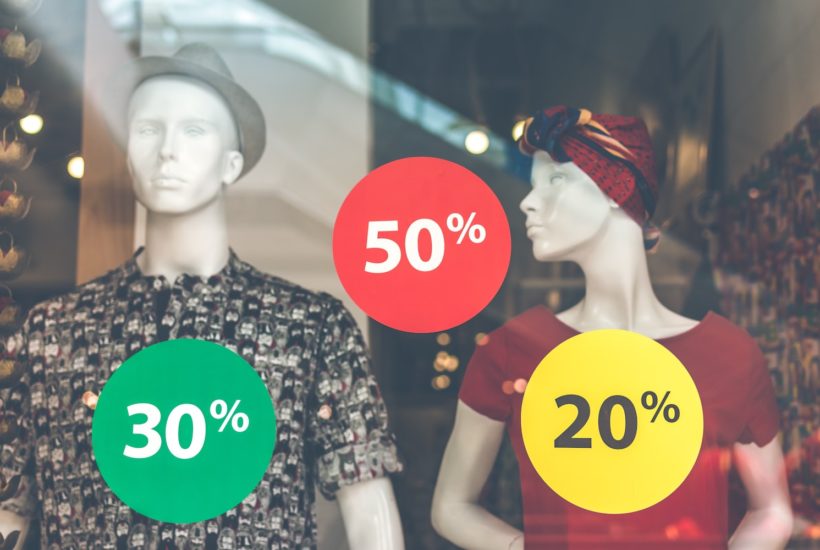Business
Spain’s top clothing brands launch huge discounts to lure buyers
The closure of all stores as a result of the state of emergency decree on March 14th is causing an unprecedented collapse in the textile sector. Data from the Business Association of the Textile, Accessories, and Leather Trade, showed that clothes sales plunged by 70.3% in March. Online sales are not good either, so stores have to encourage people to buy through huge discounts.

The big fashion chains are bringing forward internet sales in order to be able to sell all the merchandise and stock for the spring and summer season, which could not be sold in the shops. Companies such as El Corte Inglés, Inditex, H&M, Mango, or Tendam, the owner of Cortefiel and Springfield, are offering discounts of between 30% and 50%.
The closure of all stores as a result of the state of emergency decree on March 14th is causing an unprecedented collapse in the sector. Last March, the fall was already 67% in the multi-brand channel, according to the latest data from the consulting firm Kantar. Thus, so far this year, sales have accumulated a decline of 30.6%.
Be the first to find out how the big fashion chains in Spain are affected by the corona crisis and read the latest business news with the Born2Invest mobile app.
Collapse in the textile sector
However, the data from the Business Association of the Textile, Accessories, and Leather Trade (Acotex) are even worse. According to this organization, clothes sales plunged by 70.3% in March, chaining three months of falls. The problem is that the situation of online sales is not good either, with a share in the total business practically residual.
“Citizens are not in the mood to buy clothes they will not be able to wear,” Acotex pointed out. With regard to internet sales, the employer warned a few weeks ago of the situation “so dramatic” that is going through after online sales collapsed 81% since the state of alarm was decreed.
“We have closed the stores and, therefore, the income is zero, so we have no moratorium on taxes, fees, duties or social security contributions and it is necessary to waive them,” the employers stressed.
In addition, they reiterated that the sector “needs liquidity and no more debt,” as well as a solution to the problem for the payment of commercial rents that they cannot afford while the stores are closed.
Aggressive discounts are necessary to encourage consumption
The textile sector has also warned that its turnover for the year as a whole will fall by at least half due to the coronavirus crisis. Representatives also added that when the state of alarm is lifted and shops can be reopened, the situation will be “dramatic”, aware that the online business is still unrepresentative.
A few days ago, Eduardo Zamacola, president of Acotex, said that it will be difficult to return to normal and that customers come “en masse” to the stores. For that, they could bet on “very aggressive” discounts to encourage consumption, as well as “extend the season” and delay the summer sales until September.
Sale periods should be limited said CEC
The Spanish Confederation of Commerce (CEC), which represents the interests of small shops, has been calling for a long time, however, for the periods of discounts to be limited again. That is because, unlike the large chains, smaller companies cannot make discounts on a permanent basis. In fact, they are now the ones most affected by the impossibility of opening their shops and many without having an option to sell online either. Many businesses thus face a suspension of payments.
With all its shops closed and no possibility of online sales, Primark estimated a loss of $804 million (€740 million) per month. Faced with the prospect of not being able to sell the garments or having to sell them at a large discount, ABF, its parent company, has made a provision of $353 million (€325 million).
__
(Featured image by Artem Beliaikin via Unsplash)
DISCLAIMER: This article was written by a third party contributor and does not reflect the opinion of Born2Invest, its management, staff or its associates. Please review our disclaimer for more information.
This article may include forward-looking statements. These forward-looking statements generally are identified by the words “believe,” “project,” “estimate,” “become,” “plan,” “will,” and similar expressions. These forward-looking statements involve known and unknown risks as well as uncertainties, including those discussed in the following cautionary statements and elsewhere in this article and on this site. Although the Company may believe that its expectations are based on reasonable assumptions, the actual results that the Company may achieve may differ materially from any forward-looking statements, which reflect the opinions of the management of the Company only as of the date hereof. Additionally, please make sure to read these important disclosures.
First published in elEconomista, a third-party contributor translated and adapted the article from the original. In case of discrepancy, the original will prevail.
Although we made reasonable efforts to provide accurate translations, some parts may be incorrect. Born2Invest assumes no responsibility for errors, omissions or ambiguities in the translations provided on this website. Any person or entity relying on translated content does so at their own risk. Born2Invest is not responsible for losses caused by such reliance on the accuracy or reliability of translated information. If you wish to report an error or inaccuracy in the translation, we encourage you to contact us.

-

 Cannabis1 week ago
Cannabis1 week agoSouth Africa Proposes Liberal Cannabis Regulations with Expungement for Past Convictions
-

 Biotech2 weeks ago
Biotech2 weeks agoVolatile Outlook for Enlivex Therapeutics as Investors Await Clinical Catalysts
-

 Crypto3 days ago
Crypto3 days agoCrypto Markets Under Pressure as Vitalik Buterin Sells 17,000 ETH
-

 Markets1 week ago
Markets1 week agoWeather-Driven Supply Outlook Lifts Coffee Markets in Brazil and Vietnam

























